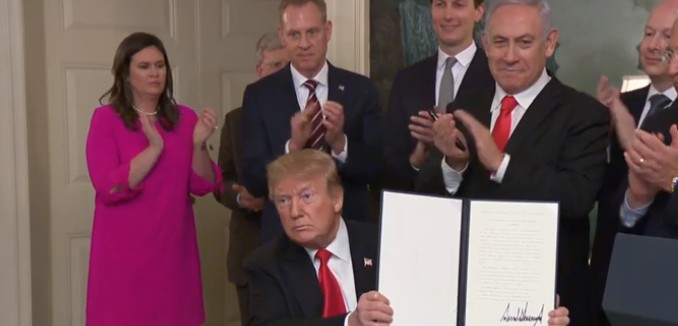In a groundbreaking development, the United States announced Monday that it formally recognizes Israel’s sovereignty over the Golan Heights, the Associated Press reported. The U.S. is the first country to sign such a proclamation.
Standing alongside Israeli Prime Minister Benjamin Netanyahu at the White House, U.S. President Donald Trump made formal a move he announced last week, saying the decision would cement Israel’s ability to defend itself from regional threats.
“Today, aggressive action by Iran and terrorist groups in southern Syria, including Hezbollah, continue to make the Golan Heights a potential launching ground for attacks against Israel — very violent attacks,” Trump said.
In his remarks, Netanyahu thanked Trump for the “historic” recognition of the territory, and for his administration’s “incredible support” for Israel. “Your proclamation comes at a time when the Golan is more important than ever for our security, when Iran is trying to establish bases in Syria to strike at Israel. From across the border in Syria, Iran has launched drones into our airspace, missiles into our territory,” continued Netanyahu.
Israel has long argued that it cannot risk a permanent entrenchment of Iranian and Hezbollah forces along the eastern shores of the Sea of Galilee. Anything that would allow Hezbollah, and by extension Iran, to threaten Israeli territory increases the chance of war in the Middle East. The shift in policy is therefore critical to the strategic security to Israel, regional stability, and in the national security interest of the U.S.
The proclamation noted the “unique circumstances” presented by the Golan, language aimed at countering the assertion that recognizing Israeli sovereignty over the Heights breaches international law.
While the UN charter prohibits unlawful territorial change resulting from a war of aggression, the criticism omits crucial exceptions relevant to the case of the Golan Heights that sets it apart from other disputed territories, including Russia’s 2014 annexation of Ukraine’s Crimea region.
During the Six Day War, Israel was defending itself from aggression on the part of its Arab neighbors, Syria, Jordan, and Egypt – in other words, the territory was not taken in a war of aggression but constituted a lawful territorial change in response to outside aggressors.
The recognition of Israeli sovereignty over the Golan came after a concerted effort on the part of Israeli officials and through bipartisan support in the U.S. Congress. The issue was also being discussed at the highest levels of the State Department and the National Security Council.
In January, House Majority Whip Steny Hoyer (D – Md.) said, “Israel should maintain control of the Golan Heights.” Rep. Josh Gottheimer (D-N.J.) sent a letter to U.S. President Donald Trump, calling for the official recognition. Rep. Eliot Engel (D-N.Y.), Chairman of the House Foreign Affairs Committee, is also supporting the move. In December, Sens. Tom Cotton (R-Ark.) and Ted Cruz (R-Texas) introduced a resolution that stated, “Israel’s sovereignty over the Golan Heights is critical to Israel’s national security” and that “Israel’s security from attack from Syria and Lebanon cannot be assured without Israeli sovereignty over the Golan Heights.”
[Photo: The White House / YouTube ]




